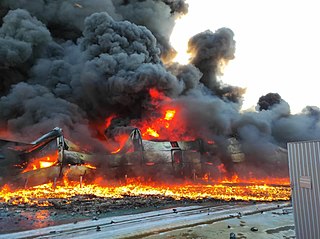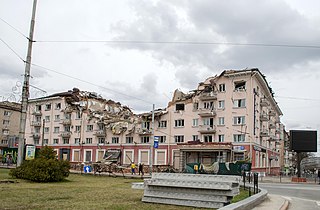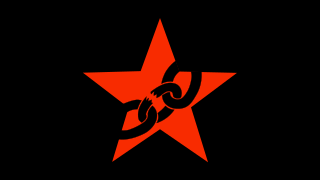
Bryansk Oblast, also known as Bryanshchina, is a federal subject of Russia. Its administrative center is the city of Bryansk. As of the 2021 Census, its population was 1,169,161.

Dmitry Andreyevich Muratov is a Russian journalist, television presenter and the editor-in-chief of the Russian newspaper Novaya Gazeta. He was awarded the 2021 Nobel Peace Prize jointly with Maria Ressa for "their efforts to safeguard freedom of expression, which is a precondition for democracy and lasting peace."

The Battle of Sumy was a military engagement which began on 24 February 2022, during the 2022 Russian invasion of Ukraine, as part of the Northeastern Ukraine offensive, and ended on 4 April 2022 when Russia withdrew all of its forces from Sumy Oblast.

The Kyiv offensive was a theater of operation in the 2022 Russian invasion of Ukraine. It involved attacks by Russia across the Russo-Ukrainian and Belarusian–Ukrainian borders, beginning on 24 February 2022, for control of Kyiv, the capital of Ukraine, and the surrounding areas of Kyiv Oblast and parts of Zhytomyr Oblast. Kyiv is the site of the Ukrainian government and the headquarters of the Armed Forces of Ukraine.

The siege of Chernihiv was a military engagement in the city of Chernihiv, in Chernihiv Oblast in the north of Ukraine. It began on 24 February 2022, as part of the northeastern Ukraine offensive, during the 2022 Russian invasion of Ukraine. On 4 April 2022, Ukrainian authorities stated that the Russian military had left Chernihiv Oblast.
On 25 February 2022, the Russian air base in Millerovo, Rostov Oblast, Russia, was attacked by Ukrainian forces during the 2022 Russian invasion of Ukraine. According to some Ukrainian officials, Ukrainian military forces attacked the Millerovo air base with OTR-21 Tochka missiles, destroying Russian Air Force planes and setting the airbase on fire.

"On conducting a special military operation" was a televised broadcast by Russian president Vladimir Putin on 24 February 2022, immediately preceding the Russian invasion of Ukraine, which greatly escalated the Russo-Ukrainian War.
The 2022 Russian invasion of Ukraine is extensively covered on Wikipedia across many languages. This coverage includes articles on and related to the invasion itself, and updates of previously existing articles to take the invasion into account. Wikipedia and other Wikimedia projects' coverage of the conflict – and how the volunteer editing community achieved that coverage – has received significant media and government attention.

The Freedom of Russia Legion, also called the Free Russia Legion, is a paramilitary group of Russian citizens, based in Ukraine, which opposes the Russian regime of Vladimir Putin and its invasion of Ukraine. It was formed in March 2022 and is reportedly part of Ukraine's International Legion. It consists of defectors from the Russian Armed Forces, and other Russian volunteers, some of whom had emigrated to Ukraine.
Several attacks in Western Russia, primarily in the Bryansk, Kursk, and Belgorod oblasts, were reported since the start of the Russian invasion of Ukraine, which began on 24 February 2022. Russia accused Ukraine of being responsible for these attacks. According to The Moscow Times, in June 2022, "Ukraine [had] not claimed responsibility for the attacks ... while not formally denying being behind them."

The Russian 2022 Laws Establishing War Censorship and Prohibiting Anti-War Statements and Calls for Sanctions is a group of federal laws promulgated by the Russian government during the Russian invasion of Ukraine. These laws establish administrative and criminal punishments for "discrediting" or dissemination of "unreliable information" about the Russian Armed Forces, other Russian state bodies and their operations, and the activity of volunteers aiding the Russian Armed Forces, and for calls to impose sanctions against Russia, Russian organizations and citizens. These laws are an extension of Russian fake news laws and are sometimes referred to as the fakes laws.

The Combat Organization of Anarcho-Communists is a militant anarcho-communist organization in Eastern Europe, part of the Belarusian and Russian partisan movement. It aims for social revolution and a libertarian socialist society. Since the start of the 2022 Russian invasion of Ukraine, it has sabotaged railway infrastructure in Russia and Belarus, as well as attacking Russian military commissariats and telecommunications. According to The Insider, the group has become "the most active 'subversive' force" in Russia since the war began.

Partisan movements emerged in Belarus and Russia following the 2022 Russian invasion of Ukraine. These resistance movements act against the governments of Alexander Lukashenko in Belarus and Vladimir Putin in Russia. Elements of the opposition also work to counter the interests of the armed forces of both countries, as well as against civilian supporters of these authorities, in order to put a stop to the war in Ukraine.

The Russian Volunteer Corps is a Russian nationalist paramilitary unit based in Ukraine. It was formed in August 2022, during the Russian invasion of Ukraine, to fight against the Russian regime of Vladimir Putin. The group's founder Denis Nikitin, and the group itself, have been described as far-right or neo-Nazi. Nikitin claims the group consists of Russian emigrants who are primarily united by their opposition to Putin. The group claims to be part of Ukraine's armed forces, but Ukrainian military officials say it is independent.

Aerial warfare in the Russian invasion of Ukraine began at dawn of 24 February 2022, with infantry divisions and armored and air support in Eastern Ukraine, and dozens of missile attacks across Ukraine. The first fighting took place in Luhansk Oblast near Milove village on the border with Russia at 3:40 am Kyiv time. The main infantry and tank attacks were launched in four spearhead incursions, creating a northern front launched towards Kyiv, a southern front originating in Crimea, a south-eastern front launched at the cities of Luhansk and Donbas, and an eastern front. Dozens of missile strikes across Ukraine also reached as far west as Lviv.
This timeline of the Russian invasion of Ukraine covers the period from 12 November 2022, following the conclusion of Ukraine's Kherson and Kharkiv counteroffensives, to the present day. Russia continued its strikes against Ukrainian infrastructure while the Battle of Bakhmut escalated.
Lyubechane is a village (selo) in Russia, located in Klimovsky District, Bryansk Oblast.
Sushany is a village (selo) in western Russia, located in Klimovsky District of Bryansk Oblast.

On 22 May 2023, armed groups crossed the border from Ukraine into Belgorod Oblast, Russia, and clashed with Russian government forces. Two Russian rebel groups allied with Ukraine—the Freedom of Russia Legion and the Russian Volunteer Corps—claimed to have taken control of several border settlements, with fighting ongoing. Russian authorities said the attacks were conducted by a Ukrainian "sabotage group", and imposed counter-terrorism measures in the region. It is the largest incursion into Russian territory since the beginning of the Russian invasion of Ukraine.
Denis Evgenievich Kapustin, aka Nikitin or Whiterex is a Russian neo-Nazi, hooligan and entrepreneur.













